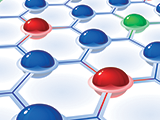IMDEA Networks

Low Delay Random Linear Coding and Scheduling Over Multiple Interfaces

Andrés García Saavedra, Research Scientist at NEC Laboratories Europe, Heidelberg, Germany
External Presentation (External Speaker)
Multipath transport protocols like MPTCP transfer data across multiple routes in parallel and deliver it in order at the receiver. When the delay on one or more of the paths is variable, as is commonly the case, out of order arrivals are frequent and head of line blocking leads to high latency. This is exacerbated when packet loss, which is also common with wireless links, is tackled using ARQ. This paper introduces Stochastic Earliest Delivery Path First (S-EDPF), a resilient low delay packet scheduler for multipath transport protocols. S-EDPF takes explicit account of the stochastic nature of paths and uses this to minimize in-order delivery delay. S-EDPF also takes account of FEC, jointly scheduling transmission of information and coded packets and in this way allows lossy links to reduce delay and improve resiliency, rather than degrading performance as usually occurs with existing multipath systems. We implement S-EDPF as a multi-platform application that does not require administration privileges nor modifications to the operating system and has negligible impact on energy consumption. We present a thorough experimental evaluation in both controlled environments and into the wild, revealing dramatic gains in delay performance compared to existing approaches.
About Andrés García Saavedra
Andrés García Saavedra received his B.Sc. (2009) in Telecommunication Engineering from University of Cantabria (UNICAN), and both his M.Sc. (2010) and Ph.D. (2013) in Telematics Engineering from University Carlos III of Madrid (UC3M). Andrés worked as a Research Fellow at the Hamilton Institute at National University of Ireland, Maynooth (NUIM) until the end of 2014, and after that he worked at the School of Computer Science and Statistics at Trinity College Dublin (TCD) until July 2015. He is currently working as a Research Scientist at NEC Laboratories Europe in Heidelberg, Germany.
Andrés’ research interests lie in the application of fundamental mathematics to real-life computer communications systems, both wired and (especially) wireless; including resource allocation problems, energy efficiency, network coding, and design of network protocols and systems. He particularly enjoy building real prototypes and carrying out experimental performance evaluations of protocols and communication systems.
Este evento se impartirá en inglés

